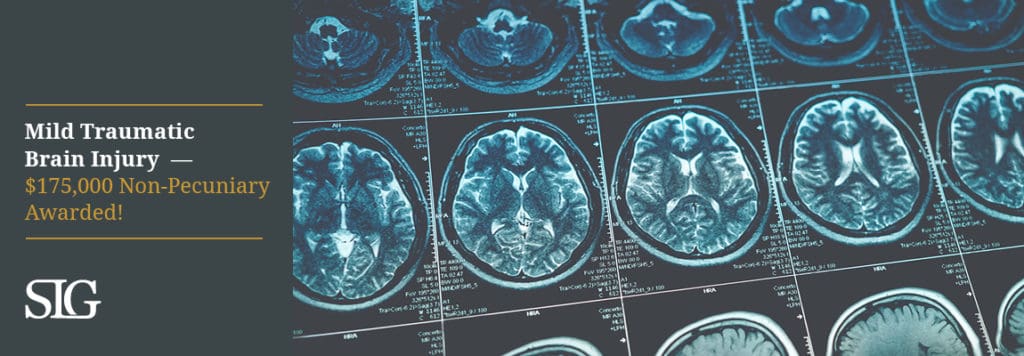
20 Apr Mild Traumatic Brain Injury and Chronic Pain Result in $175,000 Non-Pecuniary Award
The case of Sundin v. Turnbull, [2017] BCSC 15, involves an action by a Plaintiff who was injured when he was rear ended while riding his motorcycle in 2012. The Defendant admitted liability for the accident. At issue at trial were the nature, duration and effect of the injuries the Plaintiff alleged were caused by the accident. The collision was significant with the 28-year-old Plaintiff being thrown from his motorcycle and landing approximately 15 feet away from it on the pavement. His motorcycle was embedded into the Defendant’s truck, and was declared a total loss.
Following the accident, the Plaintiff complained of pain in his neck, back, hips and knees, and a sore jaw. He also complained about headaches, sleeping difficulties, irritability, mood problems and problems with his memory.
The Court was of the view that the expert evidence supported a finding that the Plaintiff would continue to suffer from chronic pain and cognitive and memory problems in the future, and would likely suffer flare ups of both his physical and psychological symptoms from time to time. Madam Justice Gerow commented as follows regarding non-pecuniary damages:
[82] As stated above, Mr. Sundin suffers from ongoing chronic pain in his neck, shoulder and back. As well, Mr. Sundin suffers from ongoing psychological symptoms and cognitive issues from the mild traumatic brain injury he suffered, including memory loss, problems with sleep and mood, anxiety, and headaches. Mr. Sundin also suffers from ongoing jaw pain and teeth sensitivity from the injuries to his teeth and jaw in the accident. As a result of his ongoing chronic pain, Mr. Sundin has developed psychological problems, including an adjustment disorder.
[83] The medical evidence is consistent with the evidence from Mr. Sundin and the lay witnesses, including his family, his friends, his co-workers and supervisors. Although Mr. Turnbull argues that the evidence does not support a finding that Mr. Sundin is less social than before the accident and his mood and personality have change, I am of the view that both the medical evidence and evidence from the lay witnesses support a finding that Mr. Sundin’s temperament and memory have changed since the accident.
[84] As noted earlier, the medical evidence is that Mr. Sundin has developed an adjustment disorder as a result of the chronic pain he suffers. He is having a hard time adjusting to the fact that he cannot pursue athletic and other activities in the manner he could before the accident, or pursue his career goals due to his ongoing chronic pain. As well, the evidence is that his mood and memory have changed as a result of the accident.
[103] Mr. Turnbull argues that an award of damages in the case at bar must take into account Mr. Sundin’s pre-accident medical history. Mr. Sundin had a history of head trauma. Mr. Turnbull asserts that even without the accident, there is reason to believe that Mr. Sundin would experience the cumulative effect of multiple concussions at this time or any time in the future.
[104] However, there is no medical or other evidence to support Mr. Turnbull’s assertion in that regard. The medical evidence is that the head injuries Mr. Sundin had in the past playing hockey, snowboarding, snowmobiling and wakeboarding were fairly minor in nature. He recovered from his head injuries very quickly, with no residual problems. There is no evidence that Mr. Sundin was suffering from cognitive, mood or memory problems prior to the motor vehicle accident on September 8, 2012. Rather the evidence is that Mr. Sundin was able to perform at a high level in a demanding job where he had to make split decisions to deal with a changing environment.
[105] Mr. Turnbull relies on Trevitt v. Tobin for the proposition that a plaintiff can be more vulnerable to injury as a result of previous accidents and injuries. Mr. Turnbull says the accident was one of the hazards that might have eventually come Mr. Sundin’s way. However, the facts in Trevitt are very different from the facts in this case. In Trevitt, the plaintiff had a low speed tumble from a motorcycle onto a car and onto the pavement. The plaintiff’s helmet was not compromised in any way that would suggest a significant blow to the head. Rather the court found that the plaintiff suffered a general bruising and shaking up in the accident. The plaintiff’s complaints did not correlate to the severity of the accident in that it was a “minor accident”. As well, it is apparent that the plaintiff’s credibility was in issue.
[106] As stated earlier, the accident involving Mr. Sundin and Mr. Turnbull was a violent one. Mr. Sundin’s motorcycle was embedded into Mr. Turnbull’s pickup truck and Mr. Sundin was thrown through the air landing on the pavement. Immediately after the accident Mr. Sundin was dazed and spitting out teeth.
[107] As well, there is no issue regarding Mr. Sundin’s credibility. I found that Mr. Sundin provided evidence in a straight forward and reliable fashion. I accept his symptoms as he described them are genuine.
[108] There is no question that Mr. Sundin’s life has changed profoundly as a result of the accident. Prior to the accident Mr. Sundin had a history of performing at a high level in both his work and personal life.
[109] As set out earlier, all the experts agree that Mr. Sundin suffered a MTBI, as well as numerous soft tissue injuries and damage to his teeth in the accident. As Dr. Benavente, the defendant’s expert, acknowledged, Mr. Sundin continues to suffer from post-concussion syndrome as a direct result of the head injury he sustained in the accident. Mr. Sundin’s ongoing symptoms of chronic headaches, problems with concentration and memory, and mood problems are attributable to the post-concussion syndrome.
[110] As well as his cognitive problems, the expert and lay evidence establishes that as a result of the accident, Mr. Sundin suffers from chronic pain in his neck, shoulders and back, problems with his teeth and jaw, and some ongoing pain in his hips and knees. The evidence is that it is unlikely Mr. Sundin will recover to his pre-accident condition, mentally or physically. Mr. Sundin is having a difficult time accepting that he cannot perform physically or mentally as he did before the accident, and as a result has developed an adjustment disorder. The ongoing symptoms Mr. Sundin is suffering from as a result of the accident impact every aspect of his life.
[111] As noted in Stapley, the assessment of non-pecuniary damages depends on the particular circumstances of the plaintiff in each case. Having considered Mr. Sundin’s age, the nature of his injuries, the severity of his symptoms and the fact they have been ongoing for four years with little improvement, the ongoing treatments, the psychological, cognitive and memory problems, and the guarded prognosis for full recovery, as well as the authorities, I am of the view that the appropriate award for non-pecuniary damages is $175,000.
If you or someone you know has been injured in a motor vehicle accident, you may be entitled to a personal injury award. Please feel free to contact us for a complimentary consultation. Victoria Lawyers, Sitka Law Group is conveniently located on Shelbourne Street near the intersection of the borders of Victoria, Oak Bay and Saanich.



